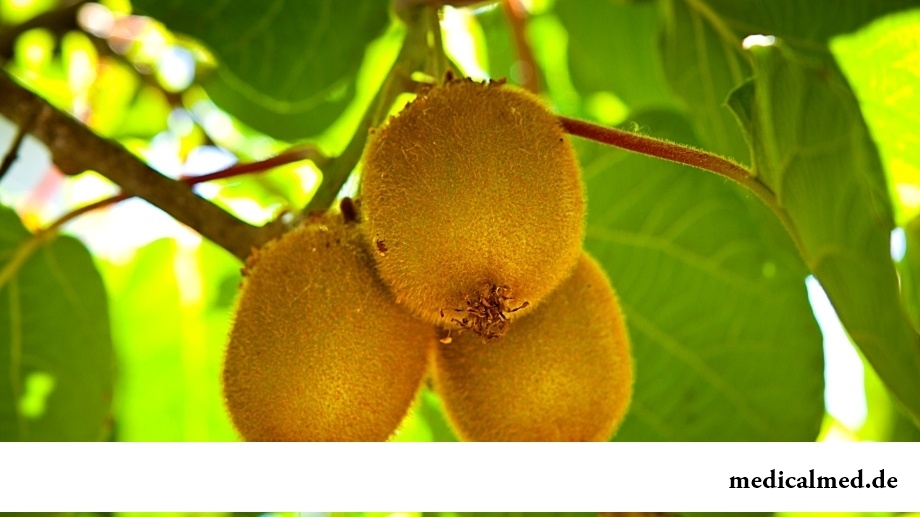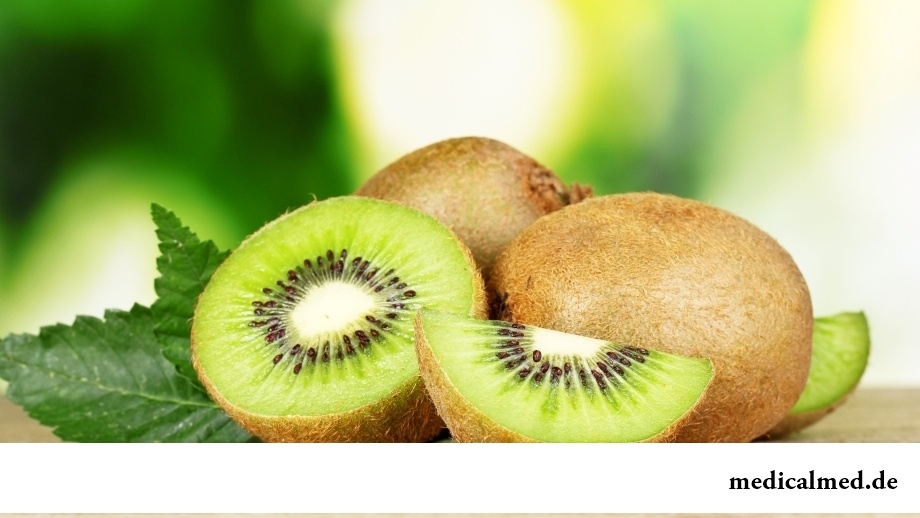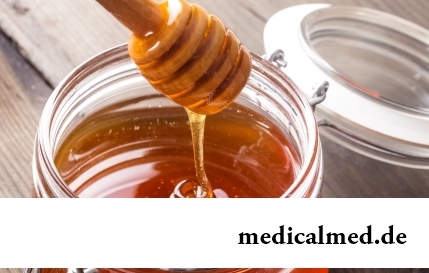





Kiwi
The kiwi has east origin as originally it began to be grown up in Ancient China. Only in 1906 fruit of a kiwi was delivered to New Zealand which many also consider it the homeland. The first name which it was given, – "the Chinese gooseberry", but after increase in demand for this fruit it was renamed into honor of the small birdie who is a symbol of this east country. Today are engaged in cultivation of a kiwi in Italy, Israel, New Zealand, in the west of France and in California.

A little softish fruit as such fruit is rather mature is considered the most tasty. Unripe fruit of a kiwi are firm to the touch in order that they ripened, they can be put on a table so that on them direct sunshine did not fall, or to turn in a paper package of bananas, pears or apples. Mature fruits are stored in the refrigerator up to 2 weeks.
The mass of fruit of a kiwi reaches about 50-150 grams. The most part of structure is occupied by water which in a kiwi about 84%, the remained 10% belong to carbohydrates, 1% – proteins, and other 5% are food fibers which are disaccharide, a monosaccharide and niacin. Also the kiwi is characterized by rather low caloric content, to fall on 100 g of this product only 48 kcal.
Useful properties of a kiwi
The advantage of a kiwi is explained by a huge amount of vitamins which contain in this overseas fruit. Besides, useful properties are not lost even at preservation as pulp of fruits has the necessary degree of acidity.
Fresh fruit of a kiwi contains such vitamins:
- vitamin C which content is equal to 92 mg on 100 g that considerably surpasses amount of the same vitamin B of a citrus and paprika;
- vitamin E which lack is noticed at fans of diets and at the use of fruit of a kiwi can be filled up reserves of this vitamin even during a diet;
- the B9 vitamin better known under the name "folic acid" according to which contents fruit concedes only to broccoli;
- the B6 vitamin familiar to us as pyrotoxin which is especially necessary for pregnant women or the feeding women, elderly people and children.
This unique vitaminized structure causes useful properties of a kiwi.
Thanks to the high content of vitamin C the use of this fruit is incredibly effective for prevention of catarrhal diseases, immunity strengthening, and also for the prevention of various infections, prevention and treatment of many problems with vessels.
Except vitamins fruit of a kiwi contains a set of various microelements which are presented by manganese, iron, iodine and mass of other useful substances. For example, in 100 g of this product 40 mg of calcium and 34 mg of phosphorus find room the whole 300 mg of potassium, and also.
The advantage of a kiwi consists also in contents in this fruit of unique enzyme which is called актинидин, just necessary for the good proteolysis, stimulation of the alimentary system and normalization of level of a svorachivayemost of blood.
Use of fruit of a kiwi
The regular use of a kiwi helps to revitalize an organism, it promotes removal from an organism of cholesterol, iron absorption, and also neutralization of an adverse effect on all systems of an organism of nitrates. The huge advantage of a kiwi is also that it is irreplaceable for prevention, and also decrease in possible risk of developing of cardiovascular and oncological diseases. Also fruit of a kiwi makes favorable impact on processes of a metabolism and digestion. Besides, with its help it is possible to normalize protein metabolism.
Useful properties of a kiwi are also concluded also that this fruit – excellent prophylactic of thrombosis, atherosclerosis, hypertension and heart failure.
If to enter only several small fruits of a kiwi into a daily diet, it is possible to make a contribution to regulation of a nervous system, to get rid of stresses and depressions. At regular use fruit of a kiwi is capable to cope with removal of salts from an organism, it helps and to prevent developing of nephroliths.
The kiwi is considered rather dietary fruit which is recommended for the use to the people suffering from excess weight. Also it is quite effective at combustion of fats – thanks to the high content of cellulose fruit of a kiwi is irreplaceable for people who keep the figure.
Rather widely the kiwi is used also in cosmetology. Cream, tonics and lotions which part kiwi fruit is nourish skin with useful substances, do it velvet and elastic therefore these properties of fruits most often use in the rejuvenating and moistening means.

Contraindications to the use of fruit of a kiwi
Though the advantage of a kiwi also is huge, nevertheless, there are certain contraindications to its use forcing to show consideration more for its use.
Fruit of a kiwi is very allergenic. Even the small piece of a fruit can cause ultraboundary allergic reaction in allergic persons. Such reaction, and sometimes even is followed by a throat dermatosis, a paraglossa an asthmatic otdyshka which can reach up to a condition of a collapse. The use of this fruit can cause an acute anaphylaxis in children allergic persons.
The use of a kiwi and to people who have gastritis and gastrointestinal diseases is not recommended.
The most rare disease – a disease the Kura. Only representatives of the tribe Faure in New Guinea are ill it. The patient dies of laughter. It is considered that eating of a human brain is an origin of a disease.

The state of health of the person depends on many factors. One of the most important is the constant but which is not exhausting, motive...
Section: Articles about health
Some people consider what for medicine of the 21st century of secrets in the field of health of the person almost does not exist. It absolutely not so. The more answers scientists receive, the more the most difficult questions are raised for them by life. Besides, there are diseases, not объясн in any way...
Section: Articles about health
Tuberculosis – a serious infectious disease which development is caused by mycobacteria (Koch's bacilli). The illness is known from an extreme antiquity. Long time fight against it was considered as ineffective. Quite often the disease affected the whole families, and mortality from it was very high. It became the reason of emergence of a set of delusions concerning transmissibility and a possibility of treatment of tuberculosis....
Section: Articles about health
Long time antibiotics were considered as a panacea from all diseases and were appointed even at insignificant symptoms of an infection. Even now...
Section: Articles about health
Transfusion of donor blood has almost century history. In spite of the fact that this procedure is quite usual for many people, process of blood donation is still surrounded with numerous myths. Today we aimed to discredit the most widespread of them....
Section: Articles about health
The pancreas performs two functions in a human body: release of enzymes without which digestion of carbohydrates, fats and proteins, and a producing hormones is impossible. The most important of them - insulin, is the main participant of carbohydrate metabolism normalizing processes of education and utilization of glucose, the main energy source for an organism....
Section: Articles about health
Antibiotics - - it is possible to call the chemical compounds suppressing growth of bacteria the break in the field of medicine which allowed to save persons...
Section: Articles about health
The summer of this year in Russia was very ambiguous. Regions suffered from a merciless heat, from pouring rains, the hail from time to time dropped out, then there was again a heat which alternated with rainfall again. Many people suffer from such sharp changes of weather...
Section: Articles about health
From the failure of work of immune system which is shown in the form of an allergy, statistically, more than 40% of the population of the globe suffer. In most cases pathological reactions cause the substances which are contained in food stuffs, hair of animals, medicines, goods of household chemicals, cosmetics, pollen of plants, etc. On the one hand, the disease such is capable to spoil quite thoroughly to the person life....
Section: Articles about health
The cosmetics intended for improvement of a condition of skin, nails and hair are used by each woman. Expenses on регуля...
Section: Articles about health
Smoking not only exerts a negative impact on the state of health of the consumer of tobacco products, but is an air polluter the substances potentially dangerous to people around. In recent years significantly the number of people, стремящ increased...
Section: Articles about health
Coffee - the tonic loved by many for the invigorating aroma and deep taste. Having the stimulating effect, coffee increases working capacity, promotes concentration of attention, fights against drowsiness and improves mood. Statistically, about 30% of inhabitants of the planet regularly use coffee, from them more than 8% are "coffee-achievers" - the persons using more than 3 cups of drink a day....
Section: Articles about health
Reactive pancreatitis - the disease which is characterized by inflammatory process in a pancreas which arises more often everything...
Section: Articles about health
Hemorrhoids – extremely widespread disease. Periodically arising inflammations and bleeding of hemorrhoidal nodes cause serious discomfort to nearly fifteen percent of adults. Meanwhile, having a clear idea of the aggravation reasons...
Section: Articles about health
Impossibility to conceive the child – a trouble of many Russian families. During quite long time was considered that main "culprits" of troubles such are women. Modern physicians claim that the situation is different: about a half of failures in attempts of reproduction are connected with male infertility....
Section: Articles about health
Health and attractiveness - eternal values, pursuing which people often use the most unusual ingredients and technicians...
Section: Articles about health
Popular joke that there are no healthy people, and is nedoobsledovanny, most of us considers an honest truth, continually it is necessary to hear that all of us are sick hardly from a school bench. It is hard to say, whether so it actually because...
Section: Articles about health
The trophic ulcer is not an independent disease. This heavy complication arising owing to a thermal injury (a burn or a frostbite), chronic pathologies of arteries or veins of the lower extremities, a diabetes mellitus, and also some defeats of connecting fabric, absorbent vessels, skin or nervous trunks. Pathology is shown in the form of not healing wound located on the internal surface of a shin, a foot sole, a heel or toes....
Section: Articles about health
In consciousness of our many compatriots idea that folk remedies if no more эфф strongly took roots...
Section: Articles about health
There comes the season of issues. Many Russians already dream of outdoor recreation, trips, beautiful seaside beaches. At this time there is no wish to think of problems with health and other unpleasant things, however there are subjects which require attention. Summer...
Section: Articles about health
One of the useful properties presented to the person by the nature is ability to feel fear. This ability is designed to signal about approach of a dangerous situation and to help to avoid in advance it to keep life. However if the fear is persuasive and is not reasonable, it can seriously limit possibilities of the person in respect of socialization and self-realization. Such pathological fear is called a phobia....
Section: Articles about health
Practice of hypnotic impact on consciousness of the person contains about two millennia. During this time scientists were in time a lot of things узн...
Section: Articles about health
High temperature - a frequent symptom of such widespread diseases as a SARS, quinsy, pneumonia, etc. To reduce heat, having facilitated a condition of the patient, doctors recommend to accept antipyretics, however their use is not always possible. Too h...
Section: Articles about health
Coffee – favourite drink of many. For the last decades it more than once already declared very harmful, extremely useful and even necessary for normal life activity. In spite of the fact that this product became for us usual for a long time, there are many myths about properties of coffee and its impact on a human body. Readers can get acquainted with the most widespread of similar delusions today....
Section: Articles about health
Statistically, in Russia about 34% of citizens smoke. Most of consumers of tobacco has problems about health sooner or later...
Section: Articles about health
Cold is such painful that each sigh becomes a victory, heat "knocks" down, and the ache in joints forces to think only of pain. Some people with approach of the first symptoms of cold make the self-sacrificing decision to have a disease standing, and to a beam...
Section: Articles about health
Quite large number of people adheres to the principles of vegetarian food. But how to be if in a family of vegetarians there are children? Whether it is possible to eat also it the same as to parents, or after all the children's organism is not adapted for the use of exclusively vegetable food? Let's try to understand....
Section: Articles about health
